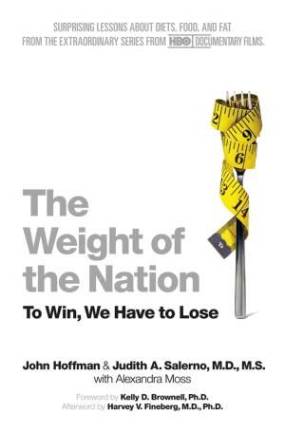Sounding the Alarm: A Q&A With John Hoffman On HBO's New Documentary, "The Weight of the Nation"

Nearly one-third of America's children and adolescents are overweight or obese. It's an alarming statistic that remains front-and-center in the public debate on our country's nutrition and exercise habits. Joining the conversation is HBO's just-released multi-part documentary, "[The Weight of the Nation](http://theweightofthenation.hbo.com/)," which takes a critical look at health issues we're facing today. To get the inside scoop on the new series and its accompanying [book](http://www.amazon.com/The-Weight-Nation-Extraordinary-Documentary/dp/1250014735/ref=sr_1_1?ie=UTF8&qid=1337181195&sr=8-1), we spoke with John Hoffman, Vice President of HBO Documentary Films. (by Tali Rosenblatt-Cohen) 1. What sparked your interest in obesity? I was struck by the fact that one out of three children born in the year 2000 will develop diabetes in his or her lifetime - one out of two if that child is African-American or Latino. It's not just developing diabetes. If that child develops the diabetes before the age of 10, his or her lifetime will be cut by 19 years, and the life will be an unhealthy one. It will be a painful one. It will have kidney failure or amputations, heart attack or stroke. So, diabetes is an awful disease, but because we are able to manage it to a great extent, I think that people are not reacting with the sense of alarm as if they were given a cancer diagnosis. But any doctor will tell you, the same sort of alarms should be happening, if you are at risk for diabetes as if you are at risk for cancer. 2. What findings in the "Children in Crisis" portion of the documentary did you find most surprising? What will parents be surprised to learn from watching it? Obviously we know there's a lot of focus on childhood obesity. But the social determinants of what is driving this increase in weight in children have to be discussed. It's the marketing of unhealthy food to children. It's the unhealthy food that's being served to them in schools. It's the lack of physical activity. I was shocked to learn that only 4 percent of elementary school children have required physical activity every day, and less than 2 percent of children in high school. And even when you look at schools having PE 3 times per week, it's only one in six schools. Parents may know that their children don't have P.E. every day, but they may be surprised to look inside the cafeteria and see exactly how bad the food is that is being offered up to their children. 3. To what degree does genetics play a role in obesity? Genetics is much more complex than we might like to think when it comes to obesity and explanations are slippery slope with no clear answers. With 2/3 of the nation already overweight or obese and predicted to rise, it's clear that the environment we're living in is overpowering our capacity to control our weight. 4. For parents of overweight or obese kids (older kids or teens), how should parents navigate the emotional terrain of changing their children's habits? That question is actually best answered by Marlene Schwartz, the Deputy Director at the Rudd Center for Food Policy and Obesity at Yale University. She writes about how home environments, communities and schools shape the eating attitudes and behaviors of children in her WaPo parenting blog, which you can check out [here](http://www.huffingtonpost.com/marlene-schwartz-phd). 5. What changes would you like to see in the food marketplace? What about with regard to children's food options, both in our schools and outside? Should federal subsidies be changing? We need to work together to make some big changes to the systems that govern the food we grow; the economies that drive the food we manufacture; the policies that regulate what we market and serve, particularly to kids; the values we place on the overall quality of the schools to which we send our children; the design of our communities, parks and roads so they promote health; and the perspective of our health care system so that it's focused on preventing illness from happening, rather than just treating it once it develops. To read the full article at New York Family [click here](http://www.newyorkfamily.com/newyork/blog-2910-sounding-the-alarm.html).